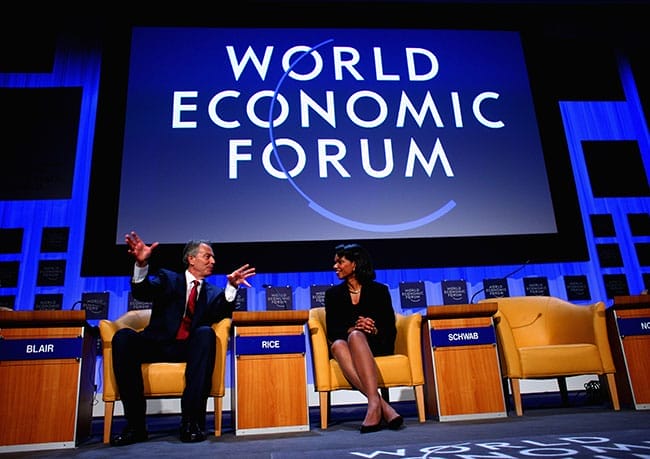
WEF Global Leadership Fellows came to Wharton to learn about social innovation and team leadership.
Imagine an organization that is world renown for allowing business, political and academic leaders the chance to exchange ideas about finance, economics, growth, innovation, public policy on a global stage. Imagine an organization that partners with top corporations to drive change and remain on the cutting edge of business practice. Imagine an organization that attracts elite young talent from around the globe for an exclusive, multiyear, intensive learning opportunity. No, I am not referring to the Wharton School. I’m talking about the World Economic Forum (WEF) and its Global Leadership Fellows Program (GLFP)—though incidentally, through no small coincidence, Wharton Executive Education partners with WEF on the program.
The WEF is best known for its annual meeting in Davos, but the nonprofit possesses a staff that works the 51 other weeks of the year too—geared toward the WEF’s mission of “improving the state of the world” through risk monitoring, network building and long-term solution discussion. To that end, 1,000 corporate members support it, and a small cadre of internal managers run it. Thousands apply for these internal, full-time positions; only about 30 people get picked each year. They come with seven to 15 years of experience, as well as master’s, MBAs, Ph.D.s and other advanced degrees.
These rising international leaders are put through a three-year program during which time they perform their WEF jobs, as well as participate in two years of formal training. It is for that training that the fellows have the privilege of attending a week at the Wharton School.
“Wharton creates an outstanding physical, social and intellectual space for the Global Leadership Fellows to reflect on and experience leadership situations and at the same time to help to embed content into a process of learning and design for solutions in complex situations. Wharton is for us a trusted partner allowing to co-create process and content of leadership development, to run experiments and taking risks,” says Dr. Gilbert Probst, member of the executive committee of the WEF and dean of the Global Leadership Fellows.
In July 2015, those fellows—WEF servant leaders all—arrived on campus to enjoy a two-track curriculum. They came seeking 100 percent experiential learning and innovative concepts that they could take back with them to the WEF. One track focused on team leadership, the other on social innovation.
We sat in on the latter, during a session led by Katherine Klein, Wharton’s Edward H. Bowman Professor and vice dean of the Wharton Social Impact Initiative. In the process, we got caught in a lively discussion on the nature of philanthropy, innovation and social impact.
Klein launched it by exploring takeaways from a number of social enterprises:
- Like the SEED Foundation, co-founded by Eric Adler WG96, with its mission of providing quality education to all through a prep-school-like environment.
- Like Blue Bird, the online banking platform from American Express for the un- and underbanked (who make up nearly one in three Americans).
- Like the MAC Aids Fund, which is the largest fund supporting AIDS research outside of the pharmaceutical business.
- Like Daily Table, which tackles food waste and food insecurity in the U.S. by bringing affordable nutrition to underserved inner-cities.
The Global Leadership Fellows expressed their high bars for why they would be attracted to social innovation: An initiative would need to make a systemic impact on society, be scalable, aim to fix root problems, be sustainable environmentally.
When the class went off script, so did the gloves—a bit. The fellows debated over whether there was too much focus on scalability and maximization. Whether we should be skeptical of big corporations involved in social innovation. Whether money comes before the social problem in social innovation.
“Why do we have to think making money is a bad thing?” one fellow demanded.
This sort of back-and-forth is what the students were hoping for.
“My key learning is that leadership starts with self-awareness, an awareness that is key to influencing not only oneself but others. Seeking, receiving, seeking and giving feedback is one element of increasing one’s own self-awareness,” said Chidiogo Akunyili C07.
Participating in the exchange, Klein offered up her own doubts too. About her own skepticism when big companies sometimes get involved. About how the field still can get hung up on whether something is “innovation” or “impact.” On one hand, she has heard AMEX leaders “walk the talk.” On the other, she had a corporate social responsibility head at a food company plead with her for ways to overcome the skepticism of the CEO.
“We’ve made a lot of progress, but it’s still early days in this field,” Klein said.
The “Holy Grail” of social enterprises is still attainable—those that are financially sustainable and scalable, reaping profits for investors and solutions for individuals and communities.
As part of their week of classroom instruction with Wharton Executive Education, the fellows ventured into the Philadelphia community to meet with local social entrepreneurs. They then traveled for a second week of training at Columbia University in New York. The experience at Wharton stuck with them, though.
“Having world-class faculty instruct us, along with exceptional leading social entrepreneurs from the Philadelphia community, allowed us to connect to the real issues social impact theory can address,” said fellows Alejandra Guzman and Alexandra Lopoukhine. “We expect to apply these learnings to our work toward improving the state of the world.”

























